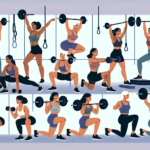Protein is an essential nutrient that plays a crucial role in the growth, repair, and maintenance of our body tissues. It is made up of amino acids, which are often referred to as the building blocks of protein. While protein is commonly associated with meat, there are plenty of plant-based sources of protein that can provide all the essential amino acids our bodies need.
In recent years, there has been a growing interest in plant-based diets, with many people choosing to adopt a vegan or vegetarian lifestyle for health, ethical, or environmental reasons. However, there is often a misconception that vegans and vegetarians struggle to get enough protein in their diets. This visual guide aims to dispel that myth by showcasing a variety of protein-rich foods that are suitable for vegans, omnivores, and meat-eaters alike.
For vegans, some of the best sources of protein include beans, lentils, chickpeas, tofu, tempeh, edamame, quinoa, nuts, seeds, and whole grains. These plant-based foods are not only high in protein but also packed with fiber, vitamins, and minerals. By incorporating a variety of these foods into their diet, vegans can easily meet their daily protein requirements.
Omnivores, who consume both plant and animal-based foods, have a wider range of protein sources to choose from. In addition to plant-based foods, omnivores can also include animal products such as lean meats, poultry, fish, eggs, and dairy products in their diet. These animal-based foods are rich in high-quality protein and essential nutrients like iron, zinc, and vitamin B12.
Meat-eaters, who primarily rely on animal products for their protein intake, often consume red meat, poultry, fish, eggs, and dairy products. While these foods are indeed rich in protein, it is important to choose lean cuts of meat and opt for healthier cooking methods like grilling, baking, or steaming to reduce the intake of saturated fats and cholesterol.
It is worth noting that the amount of protein needed varies from person to person based on factors such as age, gender, activity level, and overall health. The general recommendation is to aim for a balanced diet that includes a mix of protein sources from both plant and animal-based foods. By diversifying their protein intake, individuals can ensure they are meeting their nutritional needs and maintaining optimal health.
In conclusion, whether you are a vegan, omnivore, or meat-eater, there are plenty of protein-rich foods available to suit your dietary preferences. By incorporating a variety of plant-based and animal-based protein sources into your meals, you can easily meet your daily protein requirements and enjoy a well-rounded diet that supports your overall health and well-being.















